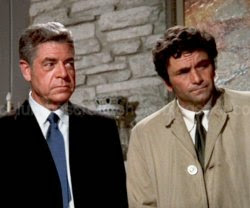 |
| "Lieutenant Columbo is still working this case," |
| the captain tells the bad guy. |
"Stop harassing me!" the bad guy tells mild-mannered Columbo. "If you don't, I'll tell your superiors."
Columbo looks abashed and apologizes. A few hours later, he is back on the guy's doorstep with "one more thing" to ask.
"I thought you were told to stop bothering me!" the bad guy exclaims to which Columbo responds, "Oh, no, they never took me off the case."
Columbo is the par exemple of individualism within a bureaucracy: he works by himself (most of the time). He has free rein: he uses his day however he likes; questions whom he likes; and follows the leads he chooses. And behind it all, in the background, never entirely present but never entirely absent is an entire complex of bureaucrats who never, never let Columbo down.
Granted, they occasionally harass him about passing his firearms qualifications or about his car. Every now and again, they make him attend "official" briefings. The rest of the time, he is left alone. Nobody breaths done his neck. Nobody forces him to jump through hoops. And nobody ever, ever abandons him in the middle of a case.
 |
| Columbo even takes down a police commissioner-- |
| and nobody even flinches. |
So it's not realistic. But it is a great break from the thousands (trillions) of cop shows and movies where the independent maverick is at constant odds with the "big machine." Since the audience is expected to always side with the independent maverick, this means overlooking the thousands (trillions) of times that the maverick cop breaks protocol. Isn't he or she fired yet?
Not to mention those seemingly endless story arcs where politics rule the day. Will the boss take the heat for the maverick cop's decision? Will the maverick cop give up his insider's identity? Will the powers-that-be lose face?
Bosses can be jerks. And political grandstanding is part of the working world. And episodes like this have their place.
The problem is that engaging with politics and bureaucracies doesn't involve quite as much unending drama as such episodes imply. As P.J. O'Rourke points out in A Parliament of Whores, being a member of a democracy--during the actual running of that democracy--is like being a cell in a plant. Likewise, facing down the big, bad machine is never as fascinating as us-against-the-establishment movies try to get viewers to believe. In the long run, paperwork is just paperwork: a great way to bring down Capone--not all that exciting in the day to day. (Trials are never as exciting as television paints them either although all sidebars have their place and the loose, boring reality of original Law & Order is far preferable to the entirely unlikely overly dramatic "reality" of later Law & Order.)
 |
| Everyone else is there for the kidnapping. |
| Columbo is there for the murder. |
The beautiful idealism of Columbo is that all the who-told-you-that-you-could-do-that stuff is all irrelevant anyway.
Are bosses as entirely hands-off and understanding (or tolerant) as Columbo's in real life?
No.
Don't we wish they would be?
Yes.
The school of "realistic literature" claims that literature should reflect "life as it is"--and then produces angsty narratives that blow "reality" far out of proportion.
I'd rather have story that doesn't pretend to be anything but story. And gives me a hopeful vision of human interaction. Columbo supplies a respectable standard for any organization--or individual. Vive l'homme in the trenchcoat!
No comments:
Post a Comment